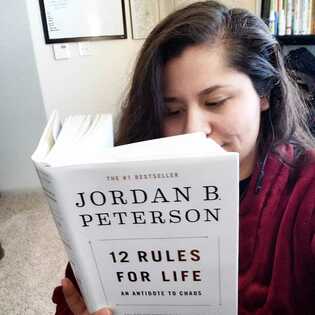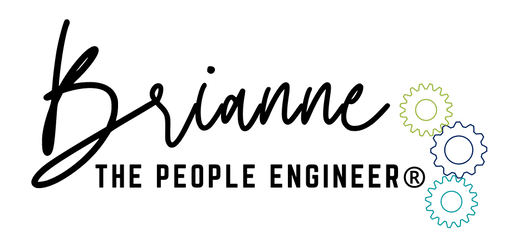 I found out about Jordan B. Peterson from an Aubrey Marcus podcast interview. I was beyond intrigued with his objective stance on human behavior especially as a clinical psychologist who took a deep dive into research focused on the worst possible outcome & how it could be avoided if we all simply took responsibility for ourselves. Interesting. I was raised & still believe that "everything in life is a choice". I live by that (to the best of my abilities). To say that I was curious about the controversy surrounding Peterson would be an understatement. But rather than make assumptions & having a hidden agenda of trying to find a way to "catch" the man saying something sexist (or anything else he's being accused of)- I decided to hear him out. I wanted to read what insight he could provide & boy did he deliver. (first & foremost, if you actually read the book - he thinks any "right" or "left" on anything is wrong & I found him quite amusing, entertaining, & educational). To be open to learning, is to be mature. Wisdom is truly acknowledging "the more you know, the more you realize you don't know". So here are the 12 Rules and how they spoke to me: 1. Stand up straight with your shoulders back Simply pulling your shoulders back and lifting your head gives you a boost of confidence, increases your oxygen intake, and in a metaphorical aspect - just means - have a spine. Stand up for yourself. Take risks. Believe in yourself and your ability to learn, fail, and grow to not be ashamed of who you are and what you're capable of. 2. Treat yourself like you would someone you are responsible for How often do we tend to our own PERSONAL needs? Neglecting ourselves in an effort to give more to others tends to be a oxymoron. I love how straight forward and relatable this chapter is. I caught myself laughing in guilt as if I was found with my hand in the cookie jar. Furthermore, the "Chaos and Order" section really had me - perception. 3. Make friends with people who want the best for you Boy did that strike home. Like most young people growing up, I wanted to be accepted and a part of the "cool kid" club. However, the majority of the "cool kids" I grew up around were not very intelligent; they'd get in trouble and be judgmental and most of the time they were rude and ugly to the rest of us 'peasants'. Nowadays, I find myself not really belonging to a 'group of friends' for those exact same reasons. My friends of spread out all over the world but they help me grow, they challenge me, they're good hearted people trying to make a difference in the world. Rule 3 is a great summation of facing the truth of "you are who you hang out with". 4. Compare yourself with who you were yesterday, not with who someone else is today. The internal critic. We all have one. Acknowledging its existence and purpose is the first step. "You are discovering who you are, and what you want, and what you are willing to do. You are finding the solutions to your particular problems and have to be tailored to you, personally and precisely." Boom. Focus on what you have, what you're working on, rather than entertaining yourself with someone else's life. If you have time to focus on someone else for any comparison - you're either bored or looking for something in someone else you should be building for yourself. 5. Do not let your children do anything that makes you dislike them Oh THIS one!!! Parenting. Societal expectations. I can't tell you how many times I had to rewind my audiobook and even pull out a notepad to write some of these teachings down. I love how Dr. Peterson opened the chapter with an oh-too-familiar scene and immediately addresses the lack of parent problem solving. Like anything else, if you just let it fester and don't tend to the issue when it becomes an issue - it'll only get worse. 6. Set your house in perfect order before you criticize the world Now as deep and dark as this chapter was - it was totally necessary. I tend to address 'emotional intelligence' and 'self-awareness' with young adults because so many of them have never heard of it before. They don't understand how normal it is to feel sad, mad, frustrated, irritated, or how they can healthily address these negative emotions internally and externally. "Life is in truth very hard. Everyone is destined for pain and slated for destruction". There it is. Truth. The hard truth, but once we're able to face it head on - call the beast by name, it no longer can have control of us. Take control back. Fight your own demons. Take responsibility for yourself and give it your all. 7. Pursue what is meaningful (not what is expedient) Often times I find myself taking on small low-hanging fruit because they're quick easy wins rather than taking the time to sacrifice, put in work, be intentional, & only choose much bigger longer-time-to-fry fish I may doubt my cabaility of taking on. 8. Tell the truth - or, at least, don't lie Be impeccable with your word. Your speech has power. Use it for good. Rebuke chaos with what you have control over - your words. 9. Assume that the person you are listening to might know something you don't Ha! This is something I personally JUST started making myself do this past year. Boy has it helped. 10. Be precise in your speech This is common knowledge but NOT common practice - this I definitely need a lot of work on. I'm a strong believer of 'say what you mean and mean what you say' but rarely do I have a direct concise message myself. I'm working on that. 11. Do not bother children when they skateboarding Oh baby! To all those people who constantly say I'm 'aggressive' and a 'b!tc#' - this chapter is for you. Let me skateboard - fool! 12. Pet a cat when you encounter one on the street Be grateful for what you have, when you have it. You'll never know when you'll have that opportunity again or how many others wish they could experience your small wins in the world. Several chapters brought me to tears. Several paragraphs made me laugh. I honestly would put this book in my top 5 to suggest to the entire world.
3 Comments
|
Archives
October 2019
Categories |
